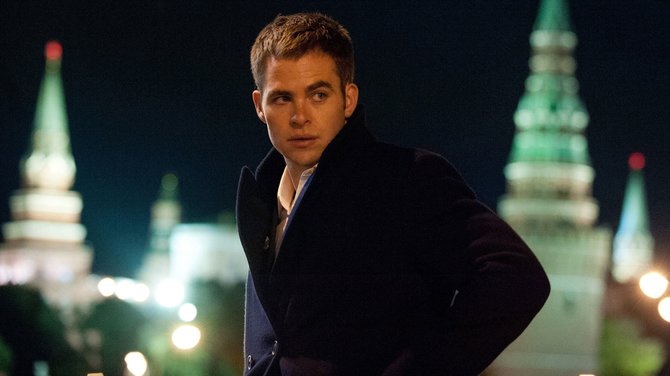Chris Pine puts on a decent performance in “Jack Ryan: Shadow Recruit,” but the film falls short of captivating.
After three actors and four films (Alec Baldwin in "The Hunt for Red October," Harrison Ford in "Patriot Games" and "Clear and Present Danger," and Ben Affleck in "The Sum of All Fears"), the "Jack Ryan" Tom Clancy spy franchise is back after 12 long years. Chris Pine stars as the title character in "Jack Ryan: Shadow Recruit" and, as I feared, this ended up being my least favorite of the series.
Directed by four-time Oscar nominee Kenneth Branagh, the movie is beautifully shot but somewhat forcefully constructed. The near-dozen camera sweeps of the New York skyline in the first 30 minutes alone alerted me that something was off.
The opening scene takes place in September 2001 at the London School of Economics, where Jack is a budding PhD candidate. Students huddle around a box TV (remember those?) as the channel repeatedly broadcasts scenes from the 9/11 World Trade Center attacks. We cut to Afghanistan, where a patriotic Jack, now a U.S. Marine lieutenant, is onboard a doomed helicopter. After a rocket-propelled grenade or some sort of missile (exactly which escapes me) crashes into the aircraft, doctors cart a critically injured Jack into surgery as a military doctor exclaims that the young officer is mere hours away from never walking again.
Enter actress Keira Knightley. She eagerly plays Cathy Muller, a physical therapist/medical student at Walter Reed Army Medical Center outside Washington, D.C. She has an overtly playful banter with her new patient, Jack. While crutched up, the slow-moving, suave patriot asks his doc out on a date. She responds that as soon as he gets up and runs out of the hospital she will say yes to dinner.
This is an origin-based "Jack Ryan" movie, so it is no surprise when veteran CIA spook Thomas Harper (Kevin Costner) observes Jack at Walter Reed and eventually recruits him. This sequence reminded me of Brad Pitt and Robert Redford in "Spy Game." Dangling the idea of post-9/11 financial terrorism threats to our homeland, Harper lures the recuperated American into the intelligence community.
The movie fast-forwards to 10 years later, present day. Jack Ryan is now deep undercover as a financial analyst at a mega Wall Street hybrid bank/corporation. His mission: Use his brains and means to scour documents and reports for financial irregularities that could possess terrorist ties. As soon as he attains senior analyst status, it just so happens that the biggest financial terrorism plot ever known is underway.
After he discovers something alarmingly suspicious, Jack convinces his financial boss to jet him on over to Moscow. Viktor Cheverin (played by director Branagh) enters the fray in Russia. We learn that Viktor, at the behest of the Russian government, has long-plotted a dual financial and physical attack on the U.S. that would cripple our economy and incur the onset of a second Great Depression.
As a classically trained Shakespearian actor, Branagh pulls off a subtle, great character performance as the ex-KGB millionaire doing the Russians' dirty work. The Moscow scenes persist to absurdity. Jack, who was just a financial nerd, is now an activated bad-ass field agent. The film eventually returns to New York, where Russian sleeper cells living in the U.S. elude the CIA, and the terrorist plot continues to unfold.
I'm not exactly sure why "Jack Ryan" does not work. The stellar cast all give credible performances. It is captured beautifully—the camera techniques and sets are creative and high-dollar. The financial terrorism is actually very interesting. I wouldn't blame Branagh for the shortcoming—he is one of the best, and simply brilliant in both acting and directing. In the end, the problem is the cliche-riddled spy story combined with an unrealistic love plot.
Will Jack Ryan and his seasoned superior stave off the second Great Depression? How will Dr. Muller factor in? If you care to find out, you should head on over to the theater. If not, stay home and Netflix Harrison Ford's two awesome Jack Ryan movies.



Comments
Use the comment form below to begin a discussion about this content.
comments powered by Disqus